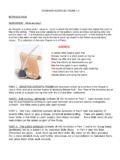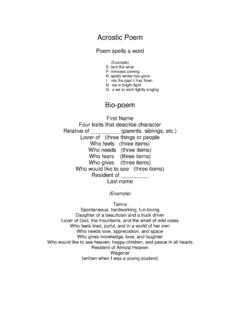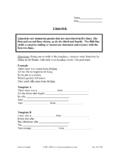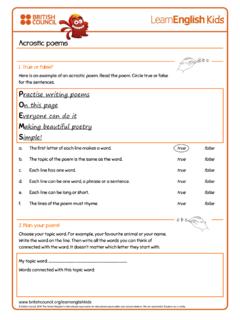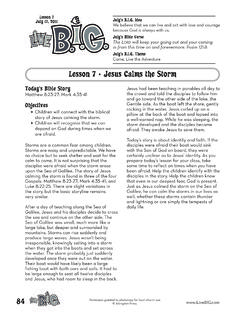Transcription of Psalm 119 - http://wordoftruthkc.org
1 Psalm 119. ! "OMMENTARY # UTLINE. THE GOLDEN ABC'S. OF THE WORD OF GOD. TABLE OF CONTENTS. Preface ..i He ..19. Zayin ..27. Yodh ..39. Mem ..51. Nun ..55. Samekh ..59. Ayin ..63. Pe ..67. Tsadhe ..71. Qoph ..75. Tav ..87. Selected Themes ..91. Preface THE FORM OF Psalm 119. The Hebrew psalter contains a number of acrostic , or alphabetic, psalms. An acrostic poem in Hebrew is one in which the initial letters of the lines form the alphabet in order. Psalms 9, 10, 25, 34, 37, 111, 112 and 145 are examples;. but Psalm 119 is the most elaborate and complete. There are twenty-two letters in the Hebrew alphabet. Under each of these letters, we find eight one-line verses, each beginning with the Hebrew letter that corresponds to its heading. This displays the intricate detail and artistic structure of the Psalm . It has didactic value as well, since neat arrangement leads to orderly thinking. The Lord (Yahweh) is mentioned twenty-two times, which is appropriate to the twenty-two letter divisions of the Psalm .
2 Eight synonyms for Scripture are used. SCRIPTURE IS CALLED THE LAW (torah). The word means instruction flowing from divine revelation. In a nar- row sense it refers to the law of Moses. Here it is used in its widest sense and is synonymous with the word of God. It views God as teacher. SCRIPTURE IS CALLED THE WORD (dabar). This refers to anything that proceeds from the mouth of the Lord. It is the broad term for divine revelation. It implies the means by which God has spoken human language. Divine revelation is not conceptual but verbal. It views God as communicator. SCRIPTURE IS CALLED THE WORD (imrah). This is derived from a verb meaning to say. It refers to anything God has said, promised, or commanded. Notice there are two distinct words translated word in NASB. WORD OF TRUTH P. O. BOX 10514 KANSAS CITY, MO 64118. PAGE ii Psalm 119. SCRIPTURE IS CALLED TESTIMONY (adhah). It is derived from a word that means to testify or witness. When God had finished speaking with Moses on Mt.
3 Sinai, He gave him the two tablets of the testimony, tablets of stone, written by the finger of God (Exodus 31:18). It views God as source of absolutes. SCRIPTURE IS CALLED PRECEPTS (pikudh). This word is used only in the psalms and is from a root meaning to visit, to appoint. It refers to a charge and thus anything the Lord has ordered. It views God as the definer of duty. SCRIPTURE IS CALLED STATUTES (hok). This word comes from a root that means to engrave and refers to something prescribed. It views God as guide. SCRIPTURE IS CALLED COMMANDMENTS (mitsvah). As is clear from the English translation, it refers to all things that God has commanded. It views God as demanding duty. SCRIPTURE IS CALLED JUDGMENTS (mishpat). This word denotes legal decisions. These are the case laws that furnish the basis for Israel's legal system. In Psalm 119 it refers to the decision made by God, the supreme judge. Some also take the words way and truth to be descriptive of the Scriptures. Psalm 119 is the longest of the psalms and certainly the longest chapter in the Bible.
4 This is appropriate: Too much cannot be said for the word of God. The godly man never tires of extolling the word. THE THEME OF Psalm 119. The theme of Psalm 119 is what the word of God is and does. It is mentioned in every verse with a couple of possible exceptions. The theme incorporates the varied responses of men to it. The word of God is to be exalted along with God's name. Psalm 138:2b reads literally, for you have exalted above all things your name and your word.. THE AUTHOR OF Psalm 119. The Psalm is autobiographical. The author is apparently a young man who writes of his relationship to the word of God. How can a young man keep his way pure? he asks (119:9). Because of his possession of the word of God, he says, I have more insight than all my understand more than the (119:99-100).. The young man is oppressed by those who despise the word of God. Even though princes sit and talk against me, Thy servant meditates on Thy statutes (119:23). Similar words are found in (119:46 and 161).
5 WORD OF TRUTH 1-800-326-4414. Psalm 119 PAGE iii In spite of the opposition, the young man is seen as growing. My soul languishes for Thy salvation; I wait for Thy word, and They almost destroyed me on earth, but as for me, I did not forsake Thy precepts (119:81, 87). As one examines the text of Psalm 119, the progress of the young man in his walk with God becomes evident. Perhaps it should be thought of as an Old Testament Pilgrim's Progress. It is our prayer that this commentary will result in your progress. Chester A. McCalley Kansas City, Missouri January 1993. WORD OF TRUTH P. O. BOX 10514 KANSAS CITY, MO 64118. a Aleph The Complete Happiness of One Who Obeys God's Word . Psalm 119:1-8. THEME. Each of the eight verses makes reference to obedience. In verses 1 and 3, the words walk in the law of the LORD and walk in His ways appear. In verse 2, he speaks of those who observe it; and in verses 4, 5, and 8, the verb keep express- es the idea of obedience. Verse 6 speaks of those who look upon it and verse 7.
6 Of those who learn it. Connected to the idea of obedience is the double repetition of the word happiness. The word opens line 1 and line 2 and is not repeated again in the rest of the Psalm . Happiness through obedience is the keynote of Psalm 119. SHORT OUTLINE. A. The Description of the Happy Man 119:1-3. B. The Duty of the Happy Man 119:4. C. The Desire of the Happy Man 119:5. D. The Destination of the Happy Man 119:6-8. COMMENTARY. THE DESCRIPTION OF THE HAPPY MAN 119:1-3. How blessed are those whose way is blameless, who walk in the law of the LORD. 2 How blessed are those who observe His testimonies, who seek Him with all their heart. 3 They also do no unrighteousness; they walk in His ways.. WORD OF TRUTH P. O. BOX 10514 KANSAS CITY, MO 64118. PAGE 2 Psalm 119. The flow of the psalmist's thought is as follows: I see what a man can be (119:1-3). It is my duty to be this kind of man (119:4). Oh, that I were that man (119:5-8)! The opening verses plunge us into the midst of the subject of the Psalm the enormous advantages of those who love and obey the word of God.
7 Only because the persons spoken of walk in obedi- ence to God's instruction do they become the subjects of this beati- tude. God's law is always to be sought for the purpose of obeying it, never for the sake of theoretical knowledge. The Psalm opens with the repetition of the word blessed, a term that occurs nowhere else in this Psalm . It comes from a verb that means to go straight. Happiness finds its source in straight living, that is, adherence to the right path without deviation. In the Old Testament, sin is often viewed in terms of deviation from a path laid out by God. There are two words that are translated blessed in the Old Testa- ment. The distinction between the two is important. One refers to a condition that comes about by man doing something. The other describes an action initiated by God irrespective of human merit or demerit. It is the former that is used here. The man who is blessed must do something in order to arrive at this condition. The context shows that condition to be obedience to the word of God.
8 The word blessed in verses 1 and 2 is plural in each case, which denotes completeness and fullness. We could bring out this mean- ing by translating each completely and fully happy.. We learn immediately where happiness is found. It is discovered in the last place most men and women look for it in obedience to the word of God. Happiness is not found by pursuit; it is a by-product of obedience to the word of God. The fully happy man is described as one whose way is blameless. The word way is found twelve times in this Psalm . It may refer to the revealed will of God, as in 119:14, 27, 32, 33, and 37). It may also refer to one's course of life one's lifestyle, which could be evil, as in 119:29, 101, 104, and 128, or good, as in the verse before us. The word blameless means to be complete, sound, unimpaired, whole, healthful. It was used to describe animals that were without blemish and therefore acceptable for sacrifice. It follows, then, that the word does not denote moral perfection.
9 It denotes God's standard for man's attainment. Who is this blameless man? The second half of verse 1 describes him. The fully happy man is one who walk(s) in the law of the LORD. The word walk is an active participle, underscoring continuous action. Walking is a metaphor for conduct, and running is a metaphor for service in both the Old and New Testament. The noun law is a Hebrew word most have heard. It is torah and means instruction. WORD OF TRUTH 1-800-326-4414. Psalm 119 PAGE 3. Verse 2 repeats the reference to the fully happy man. The verb translated keep has a broader meaning than the English translation conveys. It conveys the idea of keeping in the sense of protection, of guarding. It is used of a watchman of a city. The word testimonies is another synonym for the Scriptures. It means to affirm something as true. It is used of the Ten Command- ments. The word of God asserts spiritual and moral absolutes. The words observe His testimonies are in a construct relationship.
10 That is, they are closely tied together. We could translate protectors of His (God's) absolute truths, or truth-protectors.. The verb seek means to resort to, to consult with. It is used of careful inquiry and investigation. Verse 3 is a capstone and begins with a word that is not included in our English translation. It is a conjunction that is used to add something. It could be rendered also or furthermore. The psalmist makes a negative statement, do no unrighteousness, . and then a positive one, they walk in His ways. The positive interprets the negative. Scripture recognizes the principle of rela- tive righteousness that does not mean sinlessness. Philippians 3:12. and 15 illustrate the principle well. In Philippians 3:12 Paul dis- claims that he has already become perfect (mature); whereas in 3:15 he addresses as many as are perfect (mature). Maturity was both claimed and disclaimed. THE DUTY OF THE HAPPY MAN 119:4. Thou hast ordained Thy precepts, that we should keep them diligently.
